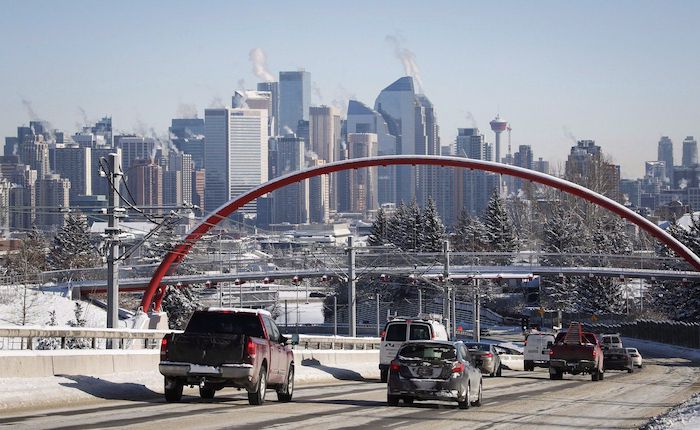Alberta
Crime Beat podcast episode 3 with Nancy Hixt: ‘If I can’t have you… no one can’ -the murder of Nadia El-Dib

From Curiouscast
Curiouscast is a new podcast network from Corus Entertainment and home to The Ongoing History of New Music, Nighttime, Dark Poutine, This is Why, as well as news and talk radio shows from all across Corus Radio. All of our podcasts are completely free and can be found on Apple Podcasts, Google Podcasts, Spotify, Tune In or wherever you find your favourite podcasts. New shows are launching all the time so make sure to check back often and enjoy Curiouscast.
People know their hometowns by streets, a favorite restaurant or the local mall. Crime Reporter Nancy Hixt knows hers by the crime scenes she’s been to.
Journey deep inside some of Canada’s most high-profile criminal cases. Each episode will take you inside the story to give you details you didn’t hear on the news.

Nancy Hixt – host of Crime Beat Podcast
The podcast is hosted by Nancy Hixt, a former RDTV reporter in Red Deer, and for the past 2 decades, crime reporter with Global TV Calgary.
In the third episode of Global News podcast Crime Beat, crime reporter Nancy Hixt tells a story of a deadly infatuation.
In “If I can’t have you… no one can” Nancy Hixt explains how Nadia El-Dib was targeted after she spurned a young man’s advances, and for the first time we hear from the police officer who was shot in the head as the manhunt for Nadia’s killer came to an end in a hail of gunfire.

Check out episode three of Crime Beat for all the behind-the-scenes details of the El-Dib case.
Anyone needing help with violence or abuse in an intimate relationship is encouraged to reach out for help by calling Connect Family & Sexual Abuse Network at 403 -237-5888 (Toll Free: 1-877-237-5888), the 24-hour Family Violence Helpline at 403-234-SAFE (7233), or 211.
 “Nancy does a remarkable job taking you deep inside real cases she has worked on to give a voice to the victims of these crimes in a way only someone who was actually there could give,” said Chris “Dunner” Duncombe, Director of Streaming and Podcasting for Corus Entertainment. “We are so excited to bring Curiouscast listeners Crime Beat.”
“Nancy does a remarkable job taking you deep inside real cases she has worked on to give a voice to the victims of these crimes in a way only someone who was actually there could give,” said Chris “Dunner” Duncombe, Director of Streaming and Podcasting for Corus Entertainment. “We are so excited to bring Curiouscast listeners Crime Beat.”
“These stories have left a lasting mark on my life,” said Hixt. “There are many things I witness and experience while covering a case, and the Crime Beat podcast allows me to share those extra details with you, with a full behind-the-scenes look at all the twists and turns.”
Nancy Hixt has received numerous awards throughout her career covering Alberta’s crime beat. She was the winner of the 2015 Ron Laidlaw Award for Continuing Coverage – National Television, the 2016 Canadian Screen Award for Best Local Reportage, as well as the 2018 Radio Television Digital News Association Edward R. Murrow Award in the large-market television category.
Twitter: @nancyhixt
Facebook: https://www.facebook.com/NancyHixtCrimeBeat/
Email: [email protected]
Alberta
Alberta’s fiscal update projects budget surplus, but fiscal fortunes could quickly turn

From the Fraser Institute
By Tegan Hill
According to the recent mid-year update tabled Thursday, the Smith government projects a $4.6 billion surplus in 2024/25, up from the $2.9 billion surplus projected just a few months ago. Despite the good news, Premier Smith must reduce spending to avoid budget deficits.
The fiscal update projects resource revenue of $20.3 billion in 2024/25. Today’s relatively high—but very volatile—resource revenue (including oil and gas royalties) is helping finance today’s spending and maintain a balanced budget. But it will not last forever.
For perspective, in just the last decade the Alberta government’s annual resource revenue has been as low as $2.8 billion (2015/16) and as high as $25.2 billion (2022/23).
And while the resource revenue rollercoaster is currently in Alberta’s favor, Finance Minister Nate Horner acknowledges that “risks are on the rise” as oil prices have dropped considerably and forecasters are projecting downward pressure on prices—all of which impacts resource revenue.
In fact, the government’s own estimates show a $1 change in oil prices results in an estimated $630 million revenue swing. So while the Smith government plans to maintain a surplus in 2024/25, a small change in oil prices could quickly plunge Alberta back into deficit. Premier Smith has warned that her government may fall into a budget deficit this fiscal year.
This should come as no surprise. Alberta’s been on the resource revenue rollercoaster for decades. Successive governments have increased spending during the good times of high resource revenue, but failed to rein in spending when resource revenues fell.
Previous research has shown that, in Alberta, a $1 increase in resource revenue is associated with an estimated 56-cent increase in program spending the following fiscal year (on a per-person, inflation-adjusted basis). However, a decline in resource revenue is not similarly associated with a reduction in program spending. This pattern has led to historically high levels of government spending—and budget deficits—even in more recent years.
Consider this: If this fiscal year the Smith government received an average level of resource revenue (based on levels over the last 10 years), it would receive approximately $13,000 per Albertan. Yet the government plans to spend nearly $15,000 per Albertan this fiscal year (after adjusting for inflation). That’s a huge gap of roughly $2,000—and it means the government is continuing to take big risks with the provincial budget.
Of course, if the government falls back into deficit there are implications for everyday Albertans.
When the government runs a deficit, it accumulates debt, which Albertans must pay to service. In 2024/25, the government’s debt interest payments will cost each Albertan nearly $650. That’s largely because, despite running surpluses over the last few years, Albertans are still paying for debt accumulated during the most recent string of deficits from 2008/09 to 2020/21 (excluding 2014/15), which only ended when the government enjoyed an unexpected windfall in resource revenue in 2021/22.
According to Thursday’s mid-year fiscal update, Alberta’s finances continue to be at risk. To avoid deficits, the Smith government should meaningfully reduce spending so that it’s aligned with more reliable, stable levels of revenue.
Author:
Alberta
Premier Smith says Auto Insurance reforms may still result in a publicly owned system

Better, faster, more affordable auto insurance
Alberta’s government is introducing a new auto insurance system that will provide better and faster services to Albertans while reducing auto insurance premiums.
After hearing from more than 16,000 Albertans through an online survey about their priorities for auto insurance policies, Alberta’s government is introducing a new privately delivered, care-focused auto insurance system.
Right now, insurance in the province is not affordable or care focused. Despite high premiums, Albertans injured in collisions do not get the timely medical care and income support they need in a system that is complex to navigate. When fully implemented, Alberta’s new auto insurance system will deliver better and faster care for those involved in collisions, and Albertans will see cost savings up to $400 per year.
“Albertans have been clear they need an auto insurance system that provides better, faster care and is more affordable. When it’s implemented, our new privately delivered, care-centred insurance system will put the focus on Albertans’ recovery, providing more effective support and will deliver lower rates.”
“High auto insurance rates put strain on Albertans. By shifting to a system that offers improved benefits and support, we are providing better and faster care to Albertans, with lower costs.”
Albertans who suffer injuries due to a collision currently wait months for a simple claim to be resolved and can wait years for claims related to more serious and life-changing injuries to addressed. Additionally, the medical and financial benefits they receive often expire before they’re fully recovered.
Under the new system, Albertans who suffer catastrophic injuries will receive treatment and care for the rest of their lives. Those who sustain serious injuries will receive treatment until they are fully recovered. These changes mirror and build upon the Saskatchewan insurance model, where at-fault drivers can be sued for pain and suffering damages if they are convicted of a criminal offence, such as impaired driving or dangerous driving, or conviction of certain offenses under the Traffic Safety Act.
Work on this new auto insurance system will require legislation in the spring of 2025. In order to reconfigure auto insurance policies for 3.4 million Albertans, auto insurance companies need time to create and implement the new system. Alberta’s government expects the new system to be fully implemented by January 2027.
In the interim, starting in January 2025, the good driver rate cap will be adjusted to a 7.5% increase due to high legal costs, increasing vehicle damage repair costs and natural disaster costs. This protects good drivers from significant rate increases while ensuring that auto insurance providers remain financially viable in Alberta.
Albertans have been clear that they still want premiums to be based on risk. Bad drivers will continue to pay higher premiums than good drivers.
By providing significantly enhanced medical, rehabilitation and income support benefits, this system supports Albertans injured in collisions while reducing the impact of litigation costs on the amount that Albertans pay for their insurance.
“Keeping more money in Albertans’ pockets is one of the best ways to address the rising cost of living. This shift to a care-first automobile insurance system will do just that by helping lower premiums for people across the province.”
Quick facts
- Alberta’s government commissioned two auto insurance reports, which showed that legal fees and litigation costs tied to the province’s current system significantly increase premiums.
- A 2023 report by MNP shows
-

 Brownstone Institute2 days ago
Brownstone Institute2 days agoThe Most Devastating Report So Far
-

 Business2 days ago
Business2 days agoCarbon tax bureaucracy costs taxpayers $800 million
-

 ESG2 days ago
ESG2 days agoCan’t afford Rent? Groceries for your kids? Trudeau says suck it up and pay the tax!
-

 John Stossel2 days ago
John Stossel2 days agoGreen Energy Needs Minerals, Yet America Blocks New Mines
-

 Daily Caller2 days ago
Daily Caller2 days agoLos Angeles Passes ‘Sanctuary City’ Ordinance In Wake Of Trump’s Deportation Plan
-

 Alberta2 days ago
Alberta2 days agoProvince considering new Red Deer River reservoir east of Red Deer
-

 Addictions2 days ago
Addictions2 days agoBC Addictions Expert Questions Ties Between Safer Supply Advocates and For-Profit Companies
-

 Aristotle Foundation1 day ago
Aristotle Foundation1 day agoToronto cancels history, again: The irony and injustice of renaming Yonge-Dundas Square to Sankofa Square






